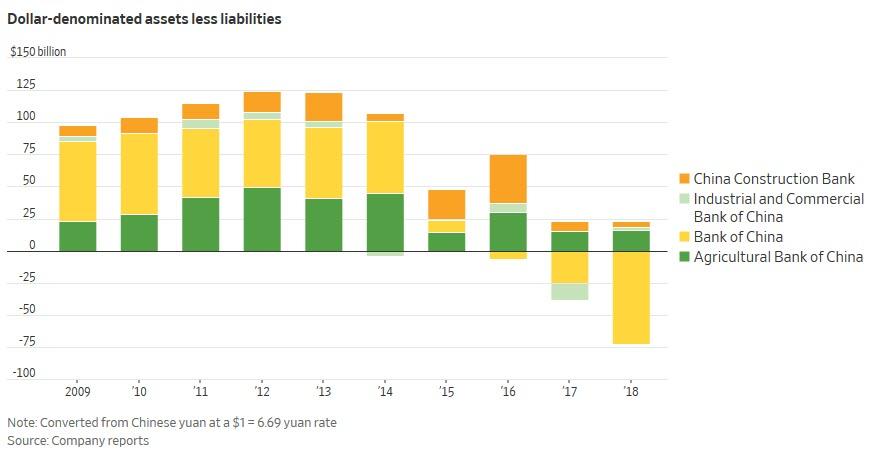Following the biggest quarterly credit injection in Chinese history, it is safe to say that China's banks are flush with yuan loans. However, when it comes to dollar-denominated assets, it's a different story entirely. As the WSJ points out, in the past few years, a funding problem has emerged for China’s biggest commercial banks, one which is largely outside of Beijing’s control: they’re running low on US dollars so critical to fund operations both domestically and abroad.
As shown in the chart below, the combined dollar liabilities at China's four biggest commercial banks exceeded their dollar assets at the end of 2018, a sharp reversal from just a few years ago. Back in 2013, the four together had around $125 billion more dollar assets than liabilities, but now they owe more dollars to creditors and customers than are owed to them.
(Click to enlarge)
The reversal is the result of just one bank: Bank of China, which for many years held more net assets in dollars than any other Chinese lender, ended 2018 owing $72 billion more in dollar liabilities than it booked in dollar assets. The other "top 3" lenders finished the year with more dollar assets than liabilities, even though their net dollar surplus has shrunk substantially in the past five years.
And yet, like everything else with China, there is more than meets the eye: as the WSJ reports looking at Bank of China's annual report, the bank's asset-liability imbalance is more than addressed by dollar funding that doesn’t sit on its balance sheet. Instruments like currency swaps and forwards are accounted for elsewhere.
This is reminiscent of the shady operations discussed recently involving Turkey's FX reserves, where the central bank has been borrowing dollar assets from local banks via off-balance sheet swaps, which it then used to prop up and boost the lira at a time of aggressive selling of the local currency. It is safe to assume that the PBOC has been engaging in a similar operation.
Additionally, as the WSJ observes, such off-balance-sheet lending "can be flighty", and citing a recent BIS study, the vast majority of currency derivatives mature in under one year, meaning they are up for constant renewal and could evaporate during times of pressure.
Of course, as we noted last week, the Turkish central bank got the idea to manipulate its currency using swaps from China, where currency swaps, meant to protect banks from liquidity crises when they lend in currencies other than their own, have boomed in recent years.... even if it still does not have "the most crucial of all" swap line - one with the Federal Reserve.
The good news is that unlike Turkey, whose net foreign asset position may be as low as just $10 billion, the imbalance at Bank of China is small relative to its balance sheet, so it shouldn’t be seen as an imminent threat. As a reminder, China has roughly $3.1 trillion in foreign exchange reserves (gross of swaps), which remain a safety backstop in case of a crunch or funding crisis, but as the WSJ notes, it is unclear how bad things would have to get before Beijing would permit its use by major commercial banks; meanwhile, in a worst-case scenario, "a heightened need to help the big four lenders also makes that hoard of reserves seem somewhat less formidable."
As for who is soaking up all the local bank's dollar assets, one culprit is China's Belt-and-Road projects, which are overwhelmingly financed in the U.S. currency, and are sending dollars overseas in the form of Chinese loans. Additionally, Chinese property developers have a rapacious demand, too.
But at the heart of this funding mismatch, there is a simple cause: as the WSJ's Mike Bird notes, "Beijing would like to be a major financial player overseas, but few borrowers have any interest in the yuan. Most international trade is accounted for in dollars, the yuan is difficult to convert and foreign owners of Chinese assets have at best an uncertain relationship with the country’s legal system."
Until that changes, expect to see the banks' net dollar funding position continue to turn increasingly negative.
By Zerohedge
More Top Reads From Safehaven.com

















